As was often the case during the time of the Soviet Union, the players recognized as being the best in the land found themselves becoming members of the Soviet Red Army and being assigned to play hockey for the army's sports club, CSKA Moscow, also known as Central Red Army. There were many benefits to playing for Red Army, as the majority of the Soviet Union National Team was comprised of the Red Army squad. The downside was living life under the stern oversight of head coach Viktor Tikhonov, who had strict control of the player's lives for 11 months a year.
Davydov's Red Army career began with the 1986-87 season with 11 goals in 32 points on the high powered club. Davydov also returned to the World Junior Championships in 1987. Things did not go according to form however, as the Soviets entered their final game with a 2-3-1 record in their game against rivals Canada, who needed to win by five goals to secure the gold medal.
With the Canadians leading 4-2 with 6:07 left in the second period, a fight broke out which led to Valeri Zelepukin, who was playing hurt with a separated shoulder, being pummeled by Mike Keane. Davydov left the Soviet bench to come to Zelepukin's rescue, which sparked the most infamous bench clearing brawl in international hockey history. The officials were powerless to break up the battling players and eventually left the ice and had the lights turned off in the arena in an attempt to end the fighting.
Eventually, after the brawl lasted some 20 minutes, both teams were disqualified from the tournament, which cost Canada a medal since they were guaranteed at least a bronze. The incident became known as The Punch-up in Piestany.
Davydov then completed his first, full NHL season in 1992-93, showing good promise with 28 goals and 49 points in 79 games, nearly twice as many as he had ever played during a Soviet regular season, where his previous maximum was 44. Also of note was his +/- rating of -2, showing he was not a one way defensive liability.
Despite the promise shown by Davydov in 1992-93, he was considered expendable in light of the Jets having a lineup that consisted of the likes of rookie superstar Teemu Selanne, Thomas Steen, fellow Russian Alexei Zhamnov, Darrin Shannon and Keith Tkachuk which resulted in Davydov being traded in September of 1993 to the expansion Florida Panthers.
Life with the expansion Panthers was difficult and not a good fit for Davydov, and after just 21 games and a mere 2 goals, he was traded to the Ottawa Senators in January of 1994 where he fared no better, scoring just 5 goals in 40 games for the even more offensively challenged Senators.
His 1994-95 season cannot be descirbed as anything but a bust, as Davydov played just 3 NHL games with Ottawa, scoring just once. He also saw action in 11 games for the San Diego Gulls and 18 with the Chicago Wolves, both of the IHL. His final NHL totals were 155 games played, 40 goals and 39 assists for 79 points.
The remainder of his career was spent back in Europe, where he spent the next ten seasons meandering through its various pro leagues. 1995-96 saw Davydov play 7 games with EHC Olten of the Swiss second division followed by 3 regular season and 13 playoff games with HC Amiens in France, highlighted by 15 goals and 24 points during the playoffs.
The next two seasons brought a measure of stability, as he signed with Brynas IF Gavle in Sweden, scoring a league leading 30 goals and 48 points in 46 games in 1996-97 followed by a 33 point season in 40 games with Brynas in 1997-98.
He was on the move again in 1998-99, splitting time between Ak Bars Kazan of the Russian Superleague (14 games) and EV Zug in Switzerland (11 games).
For the next two seasons, Davydov was back with Olten in the Swiss second division, where he excelled with 26 goals and 56 points in 1999-00 before setting career highs in 2000-01 when he cut loose for 31 goals and 80 points in 40 games, an average of two points per game.
He could not sustain that success however, as 2001-02 saw him struggle with 2 goals in 7 games with Karpat Oulu in Finland followed by 5 goals in 34 games with the Berlin Capitals in the German DEL.
If possible, Davydov's 2002-03 season was worse, as he only managed cameo appearances which amounted to 5 scoreless games with Krylja Sovetov Moscow (Soviet Wings) followed by a mere 2 games with HC Milano in the top Italian league, where he scored his lone goal of the season while acquiring another stamp in his passport.
In 2003-04, he showed some signs of his past promise. After 12 games with Olofstroms IK in the Swedish second division, Davydov again returned to Russia, only this time in the third division with Velkom Moscow, where he scored 10 goals and 30 points in 30 games.
His final season of play was with Titan Kiln, also in the Russian third division, where in 32 games he wrapped up his career with 7 goals and 25 points.
After starting his career with the prestige and stability of playing with Central Red Army and winning three league championships and three gold medals in the World Juniors, World Championships and Olympics, his move to the NHL, which looked promising after his first full season in Winnipeg, ended quickly 64 games later and he began a journey through the hockey wilderness, never spending more than two consecutive seasons with any single team, as he moved among ten leagues spread among seven countries - Switzerland, France, Sweden, Russia, Germany, Finland and Italy.
Today's featured jersey is a 1988-89 Central Red Army Evgeny Davydov jersey. Unlike today's featured jersey, this is a prime example of a typical Soviet jersey from the era that has been hammered with game use that has worn the combination of silk screening and heat pressed graphics, which have been both ground off or peeling off, particularly along the waist stripe, lower left arm and lower torso.
The Super Series of games, in which Soviet Club teams came to North America to play exhibition games against NHL club teams, gave the top Soviet clubs who came over in 1989 and 1990 (Red Army, Dynamo Riga, Khimik Voskresensk, Soviet Wings and Dynamo Moscow) an injection of cash and a nice, new set of top quality jerseys.
While some of the team's jerseys appear to have been worn for games back in the Soviet Union with Cyrillic names added, Red Army in particular, others were likely sold following the final game of the club's North American tour, probably in one of a few different manners, either as a complete team set to a well funded memorabilia seller in a shady deal out of the back door of the locker room by the team's head coach for personal gain or individually by the team's equipment manager as an impromptu garage sale to the lucky fans who happened to be in the area or the the knowledgeable individual collector hoping for just such an opportunity after the Soviet's final game before heading home.
Bonus jersey: Today's bonus jersey is a 1990-91 Central Red Army Evgeny Davydov jersey as worn during his time with the most dominant club in the history of hockey. Unlike many of the somtimes paper thin mesh jerseys with silkscreened or heat sealed graphics as seen in today's featured jersey, this Red Army jersey is a top of the line, Canadian-made CCM jersey produced to the same standards as one would find in the NHL and very likely produced for use in the 1989, 1990 or 1991 Super Series and then converted to Cyrillic names for use back home in the Soviet League.
Extra bonus jersey: Today's extra bonus jersey is a 1992 Unified Team Evgeny Davydov jersey as used in the 1992 Winter Olympics in Albertville, France. With the upheaval of the political situation in the Soviet Union in 1991, there was little time to sort out what kind of identity the brand new team made up of six of the 15 former Soviet republics would compete with.
Unlike the screened or heat pressed Soviet jerseys, this Tackla jersey uses the dye sublimation process, in which each jersey starts as a white blank jersey and then has all the graphics dyed into the jersey, not added onto the jersey, a much superior process which is permanent and allows the jersey to retain its vibrant colors indefinitely.

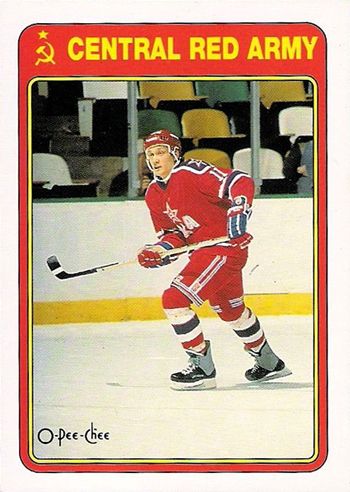
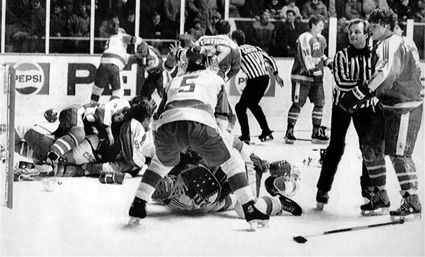
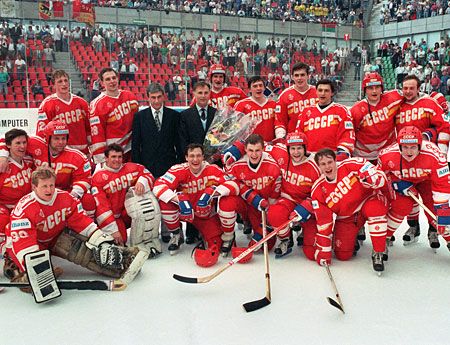
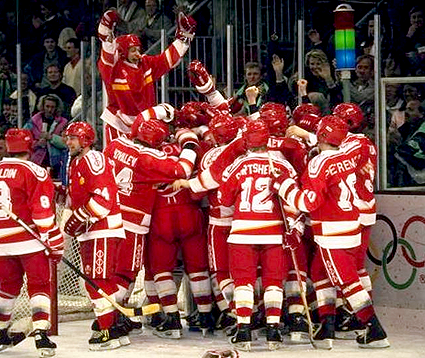
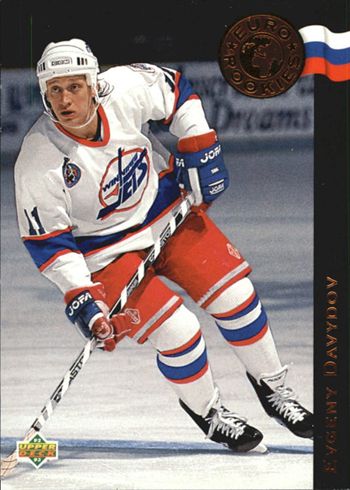
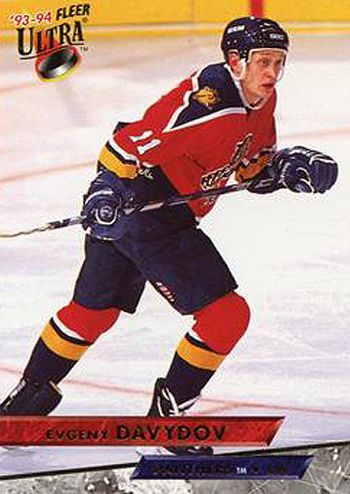
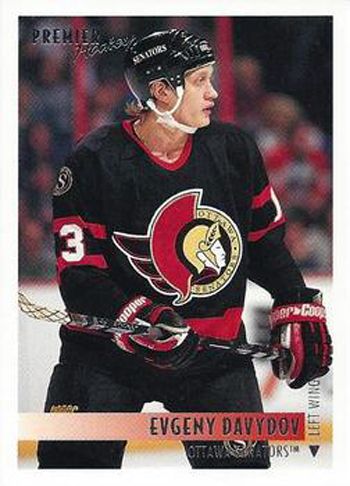
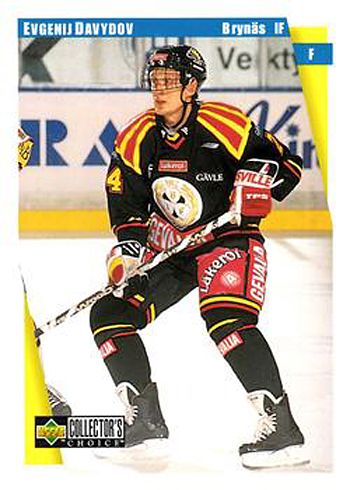
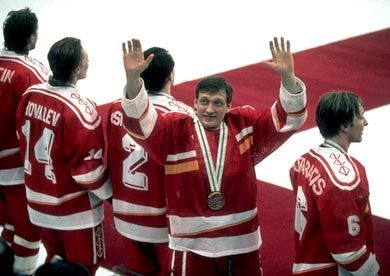
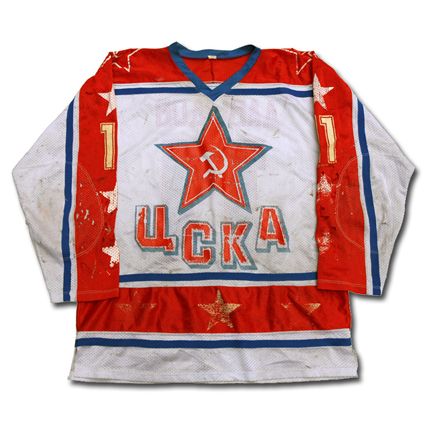
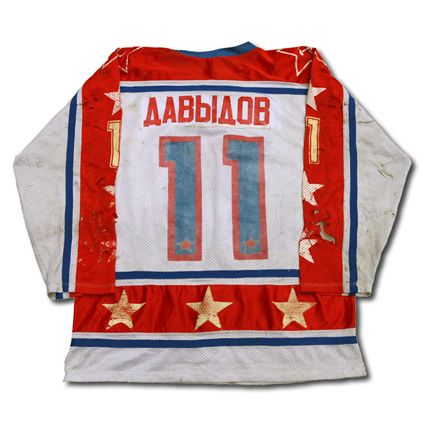
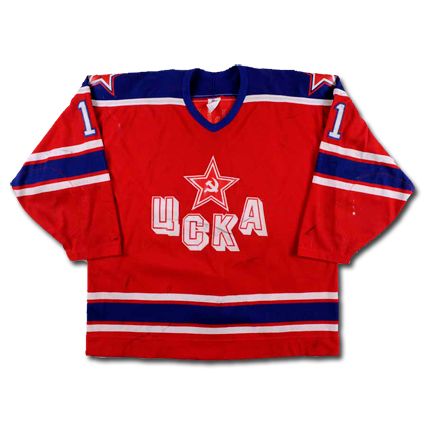
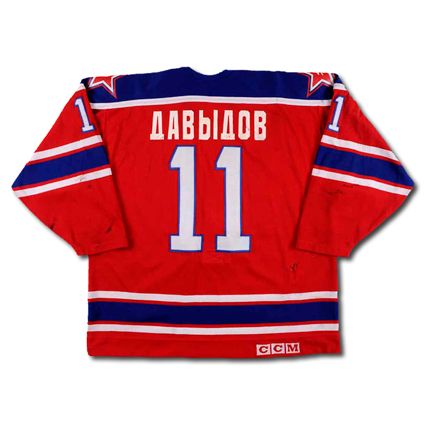
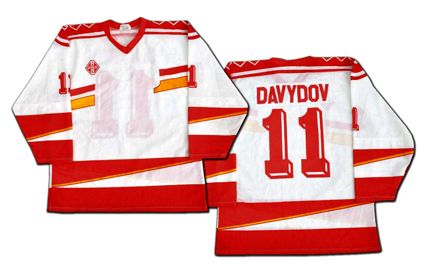










No comments:
Post a Comment
We welcome and encourage genuine comments and corrections from our readers. Please no spam. It will not be approved and never seen.